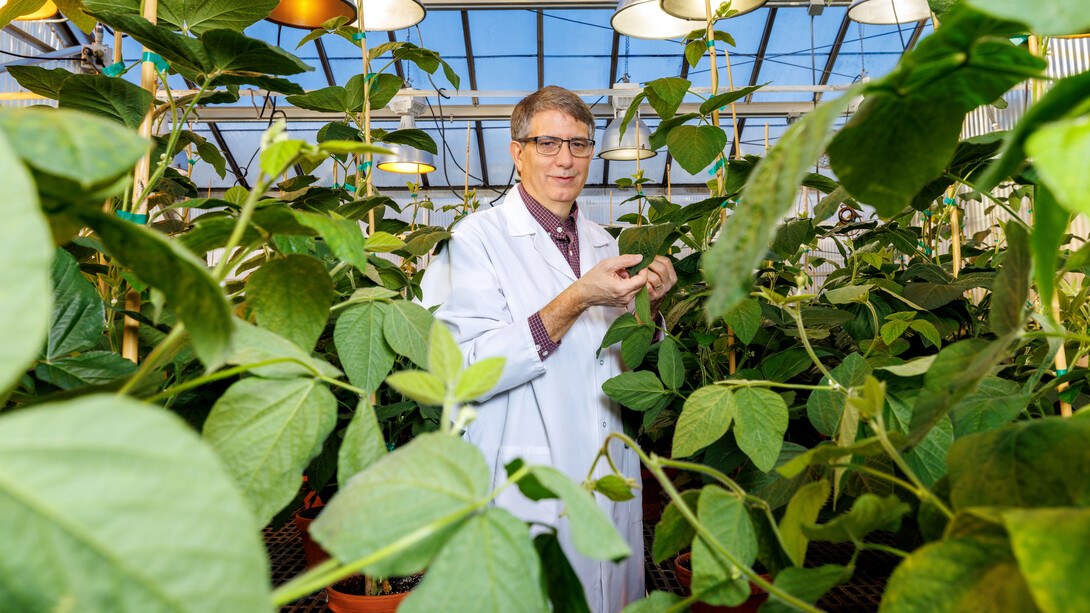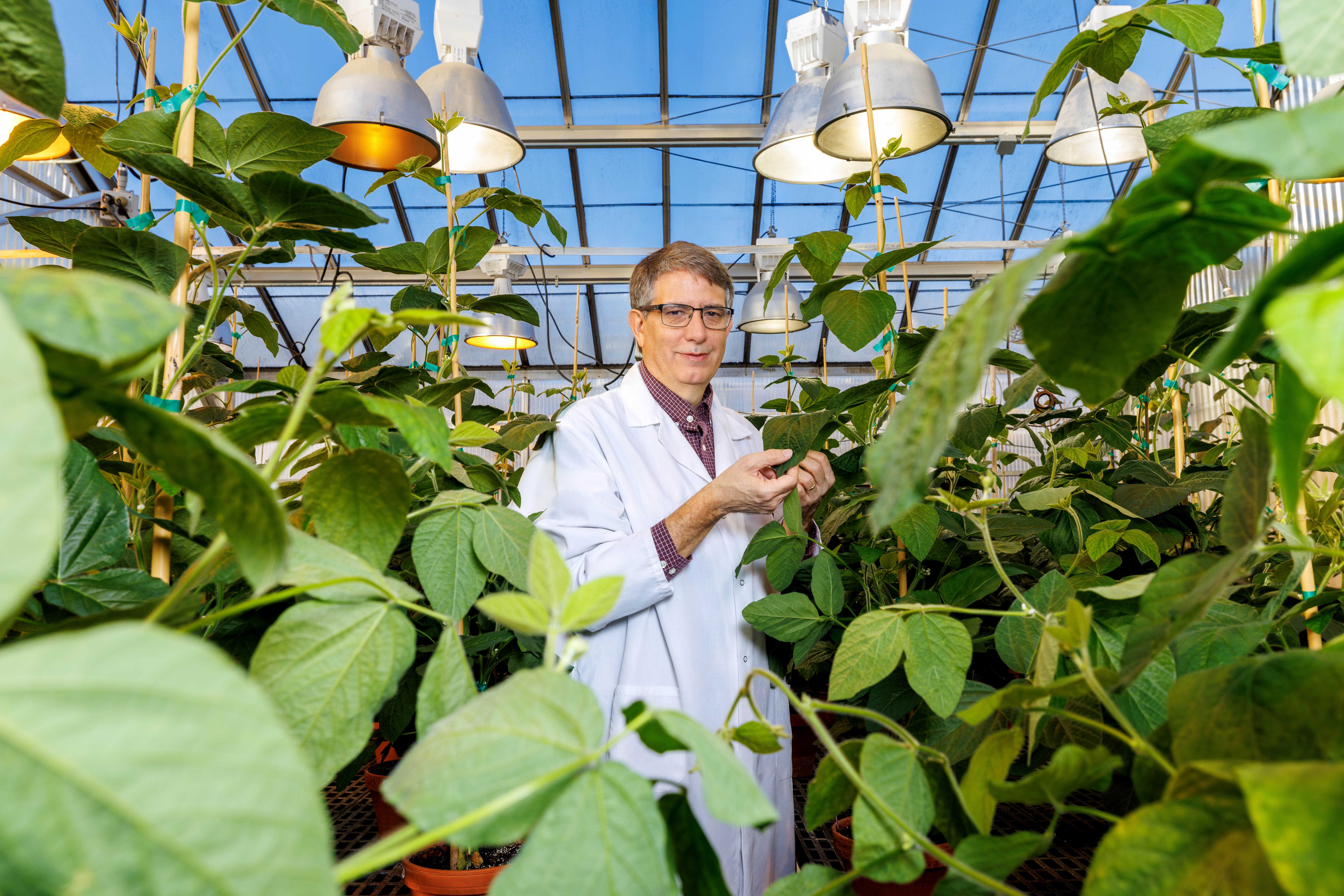
A University of Nebraska–Lincoln biochemist has been named a fellow of the National Academy of Inventors, the highest professional distinction accorded solely to academic inventors.
Edgar Cahoon, George Holmes Professor of biochemistry and director of the university’s Center for Plant Science Innovation, is one of 170 new NAI fellows announced Dec. 10. Fellow status recognizes academic inventors who have demonstrated a prolific spirit of innovation in developing inventions that have tangibly impacted quality of life, economic development and the welfare of society.
Cahoon, an internationally recognized expert in plant lipid biotechnology, focuses his work on developing new types of oils that have improved functionalities for food, feed and industrial uses. His research to identify new genes, fatty acid structures and biochemical pathways in plants has generated 36 U.S. patents and improved crops’ nutritional and industrial value and agronomic performance.
Cahoon said his success in translating discoveries to the marketplace reflects the university’s culture of innovation.
“Our Center for Plant Science Innovation and our university has this philosophy of doing great science to make new discoveries and thinking about how we can apply those discoveries to benefit agriculture and society. That’s our strong point,” he said. “I’ve been very fortunate to be able to spend part of my career here at UNL, which has this spirit of innovation and the resources to do great science and make discoveries.”
The accolade highlights Cahoon’s leadership in conducting impact-focused research.
“We’re thrilled to see Dr. Cahoon honored by one of the world’s most prestigious organizations for inventors,” said Jennifer Nelson, interim vice chancellor for research and innovation. “His record exemplifies what’s best about Nebraska research: our commitment to transforming academic research into real-world innovations that benefit our state and beyond.”
Prior to joining Nebraska in 2008, Cahoon was part of a crop genetics discovery team at DuPont tasked with developing crops that produce vegetable oils with improved food and animal feed traits. Some of his most significant patents arose from that work, including efforts to develop land-based substitutes for fish oil that increase the aquaculture industry’s sustainability. Cahoon’s team identified the genes and biochemical pathways that fuel production of heart-healthy, long-chain omega 3 fatty acids in marine organisms. They transplanted that machinery to soybean plants, creating a renewable source of oils for aquaculture feed.
That work laid the foundation for DuPont’s Fungal Omega-3 New Harvest oil that was sold at GNC stores across the country and Nuseed Global’s Omega-3 Canola Oil, which is used by the aquaculture industry.
Another of Cahoon’s major patents stemmed from work aimed at extending the shelf life of pork. Vitamin E — the generic name for tocotrienols and tocopherols — can prolong shelf life by increasing antioxidant activity. Cahoon discovered the gene and biochemical pathway in barley responsible for producing tocotrienols, then engineered those components into corn — boosting the kernels’ vitamin E content sixfold and opening the door to vitamin E-enriched animal feed.
Cahoon showed that this vitamin E fortification process works in almost any plant system. This fueled DuPont-Pioneer Hi-Bred’s development of biofortified crops, including “golden sorghum,” which contains elevated levels of pro-vitamin A and other micronutrients. Using a related approach, Cahoon’s team engineered cassava plants with increased amounts of provitamin A-beta carotene as part of the Bill and Melinda Gates Foundation-funded BioCassavaPlus program. These techniques could help end sub-Saharan Africa’s fight against vitamin A deficiency, which contributes to childhood blindness and other health problems.
Cahoon is a world leader in fatty acid desaturation, a process key to the nutritional and industrial quality and properties of vegetable oils. He holds numerous patents related to plant palmitoyl-acyl carrier protein desaturase enzymes, which are capable of inserting double bonds at various places in a fatty acid chain. This process changes the oil’s properties — creating a higher melting point, for example — which paves the way to developing healthier food products containing unsaturated fats.
At Nebraska, Cahoon has extended his trajectory of innovation. In 2018, he was part of a team that discovered two new vegetable oils in Chinese violet cress, one of which was coined “Nebraskanic acid.” It was the first discovery of its kind since the 1970s and has led to a patent related to the oils’ potential as biolubricants.
With U.S. Department of Energy funding, Cahoon leads a team exploring the use of pennycress and camelina as fatty acid sources for biofuels and biomaterials. In a separate DOE-funded project, Cahoon is developing high-biomass sorghum that contains vegetable oils in its stems and leaves.
Cahoon has also continued to improve plant-based aquaculture feed. With Nebraska Soybean Board funding, he is developing strategies to increase the levels of astaxanthin — the pigment that lends salmon its red color and extends its shelf life — in soybean oil.
Cahoon traces his penchant for innovation to his graduate training, where his adviser John Ohlrogge emphasized science’s capacity to transform lives.
“I learned that science is not just about discovering interesting things,” Cahoon said. “It’s about putting those interesting things into practice and making useful products and prototypes.”
He imparts that mentality to the Husker students and early career researchers he mentors. Cahoon has trained nearly 40 graduate students and postdoctoral fellows at Nebraska and leads the Crop-to-Food Innovation summer program, a U.S. Department of Agriculture-funded initiative for undergraduate students in the agricultural sciences.
Cahoon has published more than 180 papers that collectively have been cited more than 17,000 times. He is a fellow of the American Association for the Advancement of Science and the American Society of Plant Biologists and was awarded an honorary doctorate by the Swedish University of Agricultural Sciences. Cahoon also received the Outstanding Research and Creative Activity honor — one of the University of Nebraska’s most prestigious designations — in 2020.
Cahoon will be honored at the 14th NAI Annual Conference in June in Atlanta, Georgia.
The University of Nebraska–Lincoln is among 13 founding institutions of the National Academy of Inventors. Cahoon is the 13th Husker researcher to be named an NAI fellow.








